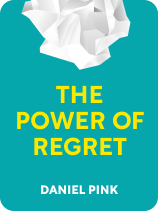

This article is an excerpt from the Shortform book guide to "The Power of Regret" by Daniel Pink. Shortform has the world's best summaries and analyses of books you should be reading.
Like this article? Sign up for a free trial here.
Are there decisions you regret? How can you harness regret to your advantage?
According to Daniel Pink, regret has the power to benefit our lives, but only if we know how to use it. In his book The Power of Regret, Pink provides strategies for processing and growing from regret as well as anticipating future regrets so you can make better decisions.
Learn how to overcome regrets in life by turning them to your advantage.
Processing and Growing from Regret
Pink identifies processing as the best approach as the key to learning how to overcome regrets in life. Broadly speaking, processing includes thinking and reflecting on your past decisions, analyzing the source of your regret, and making new decisions to guide your future actions. Pink considers this a proactive approach that leads directly to action. Once you process and understand your regrets, they can lead you toward a better life.
Pink identifies five steps to help you process and grow from your regret: reveal the regret; forgive yourself; find something positive; find a lesson; commit to action.
Step #1: Reveal the Regret
Pink explains that before you can begin processing regret, you’ll need to reveal it, either to yourself or others. People often carry regret around as a personal secret, which can make it much more difficult to process.
Pink cites research that demonstrates the benefits of talking about your regrets. He states that people find talking about themselves intrinsically rewarding. He also explains that talking through negative experiences helps people organize their thoughts and integrate their experiences into a larger positive narrative of their lives. Telling someone else about regrets can also relieve feelings of shame or guilt.
You can reveal your regret by talking about it with a close friend, family member, or therapist. If that sounds too intimidating, you can even start by simply writing about your regrets in a journal.
(Shortform note: Psychologists shed light on why secrecy makes it so much harder to process regret. People tend to ruminate on their secrets, an unhealthy process similar to the “wallowing” approach Pink identifies earlier. Secrets are also felt as a physical burden—those who carry them feel as though their physical energy is drained away. Lastly, secrets prevent people from forming strong connections with others. Those who carry secrets in relationships feel less authentic in their relationships and therefore less connected.)
Step #2: Forgive Yourself
Pink advises that as you reveal and process your regrets, it’s essential to treat yourself with forgiveness. Self-forgiveness is simply being kind to yourself—viewing your mistakes with empathy and understanding rather than judgment—as you look at moments of your life that you’re not very proud of. Self-forgiveness has the power to normalize negative experiences so that they feel less overwhelming and painful. People often blow unforgiven transgressions out of proportion because they feel overwhelming. By treating yourself with empathy, your mistakes will appear normal and manageable.
Pink stresses that self-forgiveness differs from self-esteem. Self-esteem, he reasons, simply means having a positive opinion of yourself. Pink argues that many people maintain positive self-esteem by focusing on the best parts of themselves while trivializing or ignoring the negative parts of themselves. This can result in avoidance rather than processing. Self-forgiveness, instead, requires you to focus on the traits and habits that you don’t view highly. You just need to go about it in a kind and empathetic way.
(Shortform note: Many people might find self-forgiveness counterintuitive or feel that it doesn’t come naturally. Psychologists argue that treating yourself with compassion and empathy is a skill you must develop through practice. This practice begins with self-observation. Pay attention to your thoughts and feelings as you go about your day. Then work on responding to your inner self the way you would respond to a close friend.)
Step #3: Find Something Positive
Pink recommends that regret can be easier to process if you can find something positive that happened as a result of your past decision, or at least a way that things could have gone worse. Recall that the process of regret requires comparing your current life with an imaginary narrative of how things could have gone. Finding something positive requires you to imagine ways your life could have gone worse without this decision.
For example, a relationship might not have been right for you, but you grew a lot and came to a better understanding of your needs because of it. Or a job might not have given you the skills to advance in your career, but you made some great new friends with your coworkers. Had you not had this relationship or this job, you would have missed out on positive things as well as negative ones.
Step #4: Find the Lesson
To grow from your regret, Pink explains that you need to find the lesson. Recall that regret has the power to teach us our priorities in life. However, this lesson usually isn’t immediately obvious. You need to analyze your regret and think through what it has to teach you. Ask yourself what you would do differently if granted a chance to make a decision like this again. Then you can ask yourself what you want to do now or what decisions you would like to make in the future.
Pink recommends that you try to view the situation from an outside perspective. Imagine that a friend came to you with this regret. What advice would you give someone else in your position? How would you guide someone else through your exact situation? This often yields the best approach for you to take.
(Shortform note: Motivational experts extend Pink’s advice for learning from your mistakes. First, they emphasize the importance of first reframing your mistake as an opportunity to learn. This will motivate you to find the lesson and do better next time. Second, they recommend four questions to help you analyze the situation thoroughly: 1) “What was I trying to do?” 2) “What went wrong?” 3) “When did it go wrong?” and 4) “Why did it go wrong?”)
Step #5: Commit to Action
Pink explains that the last part of growing from your regret is committing to action. To get the most out of your regret, you must use it to proactively improve your life. Pink explains that there are two approaches to acting in response to regret: 1) trying to reverse the regret and 2) consciously re-shaping your decisions in the future.
Reversing the regret is the process of trying to remedy the detrimental effects of a past decision. This could include apologizing to someone you’ve wronged and making amends. Furthermore, if there’s something you wish you had started doing earlier in life, like exercising or learning a musical instrument, you can simply start doing those things now.
But some things can’t be reversed. Sometimes the window of opportunity has closed and you really can’t change a situation. For example, you can’t apologize to someone once they’ve passed away. However, you can still learn from your regret and use those lessons to guide future actions. For example, if you regret how you treated someone who has passed, consider your current relationships. Where are the opportunities to deepen your relationships and treat people ethically? Are there people in a similar situation whose lives you could improve? Regret can still play an important role in helping you find a new path in life.
Forecasting Regret to Make Better Decisions
Lastly, Pink recommends that you can use your regret to help you make better decisions by forecasting future regrets. When you are facing a difficult decision in life, try to imagine your life years down the road and ask yourself: “Which choice would I regret more?” This can clarify what is most important in your life and help you make better decisions.
However, this advice comes with a catch. People often incorrectly forecast how much they will regret a choice. They tend to overestimate how much they will regret small things in life, like overpaying for an appliance. Many poor decisions are quickly forgotten because life simply goes on.
Therefore, Pink recommends that you use this tactic only for life decisions involving the four main categories of regret. Recall that these are: stability, ethics, personal risk-taking, and relationships. If you are facing a decision that will directly impact these areas of your life, Pink recommends you try to forecast which will cause the greatest regret. Otherwise, there’s no need. You’re unlikely to regret a wrong decision on the smaller things in life.
(Shortform note: In Stumbling on Happiness, Daniel Gilbert cautions that making decisions out of forecasted regret often leads people to play it safe and make lower-risk decisions. They reason that the large costs of a personal risk will lead to regret, and so they make low-risk decisions to avoid it. However, recall that bravery is one of Pink’s categories of regret. People are actually more likely to regret playing it safe than taking personal risks even though they often anticipate the opposite to be true. So if we aren’t careful in applying Pink’s categories, the practice of forecasting regret could lead us to make decisions that we will actually wind up regretting more.)

———End of Preview———
Like what you just read? Read the rest of the world's best book summary and analysis of Daniel Pink's "The Power of Regret" at Shortform.
Here's what you'll find in our full The Power of Regret summary:
- A look at why most people feel regret, and what causes it
- The three worst ways to deal with regrets
- The five-step process for turning regrets into advantages






